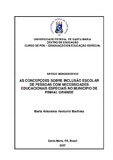| dc.contributor.advisor | Damilano, José Luiz Padilha | |
| dc.creator | Martinez, Maria Antonieta Venturini | |
| dc.date.accessioned | 2015-08-24T13:26:10Z | |
| dc.date.available | 2015-08-24T13:26:10Z | |
| dc.date.issued | 2007-10 | |
| dc.date.submitted | 2007 | |
| dc.identifier.uri | http://repositorio.ufsm.br/handle/1/957 | |
| dc.description | Artigo (especialização) - Universidade Federal de Santa Maria, Centro de Educação, Curso de Especialização em Educação Especial - Déficit Cognitivo e Educação de Surdos, RS, 2007. | por |
| dc.description.abstract | The present work had as objective to identify and to understand the
conceptions of the teachers and students from regular education, as well as, of
parents of people with special educational needs , of the City Pinhal Grande, Rio
Grande do Sul state, on the pertaining to school inclusion of these people.
Participated of this study teachers and students of the Municipal School of Basic
Education Jose Rubin Filho and the State School of Basic Education Rui Barbosa
and parents of people with special educacional needs. It was delimited metodológica
option to a qualitative boarding and as strategy of collection of data was used the
half-structuralized interview. The gotten data had pointed that the forms to think of
the teachers on subjects related to the pertaining to school inclusion still are in
construction. In what if they relate to the parents, the results had indicated that they
perceive the deficiency of the son as something that causes great suffering and that
it brings social comprometimentos, mainly related to the study and the work. As
much the majority of the parents how much of the interviewed professors it believes
not to be possible the pertaining to school inclusion of these children, in the current
circumstances, for considering the school of regular education unprepared to receive
them e, in the case of people with cognitivo déficit marked by realize its development
as na impossible the calss room of regular schools. How much to the interviewed
pupils, the majority presented a positive opinion about inclusion, but also it placed in
prominence the unpreparedness of the pertaining to school community to receive
these students.. | eng |
| dc.language | por | por |
| dc.publisher | Universidade Federal de Santa Maria | por |
| dc.rights | Acesso Aberto | por |
| dc.subject | Inclusão escolar | por |
| dc.subject | Necessidades educacionais especiais | por |
| dc.subject | Concepções de professores | por |
| dc.subject | Pais | por |
| dc.subject | Alunos | por |
| dc.title | As concepções sobre inclusão escolar de pessoas com necessidades educacionais especiais no município de Pinhal Grande | por |
| dc.title.alternative | The conceptions on pertaining to school inclusion of people with educational necessities special in the city of Pinhal Grande | eng |
| dc.type | Trabalho de Conclusão de Curso de Especialização | por |
| dc.degree.local | Santa Maria, RS, Brasil. | por |
| dc.degree.specialization | Educação Especial - Déficit Cognitivo e Educação de Surdos | por |
| dc.description.resumo | O presente trabalho teve como objetivo identificar e compreender as concepções dos professores e alunos do ensino regular, bem como, de pais de pessoas com necessidades educacionais especiais, do Município Pinhal Grande, Estado Rio Grande do Sul, sobre a inclusão escolar dessas pessoas. Participaram deste estudo professores e alunos da Escola Municipal de Educação Fundamental José Rubin Filho e da Escola Estadual de Educação Básica Rui Barbosa e pais de pessoas com necessidades educacionais especiais. Delimitou-se a opção metodológica a uma abordagem qualitativa e como estratégia de coleta de dados foi utilizada a entrevista semi-estruturada. Os dados obtidos apontaram que as formas de pensar dos professores sobre temas relacionados à inclusão escolar ainda estão em construção. No que se referem aos pais, os resultados indicaram que eles percebem a deficiência do filho como algo que acarreta grande sofrimento e que traz comprometimentos sociais, principalmente relacionados ao estudo e ao trabalho. Tanto a maioria dos pais, quanto a maioria dos professores entrevistados acreditam não ser possível a inclusão escolar dessas pessoas, nas atuais circunstâncias, por considerarem a escola de ensino regular despreparada para recebê-las e , no caso de pessoas com déficit cognitivo acentuado, por perceberem o seu desenvolvimento como impossível numa sala de aula de ensino regular. Quanto aos alunos entrevistados, a maioria apresentou uma opinião positiva sobre inclusão, mas também colocou em destaque o despreparo da comunidade escolar para receber estes alunos. | por |
| dc.publisher.unidade | Centro de Educação | por |


